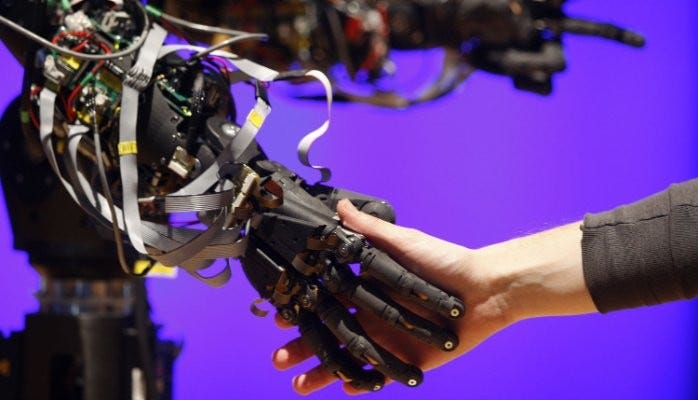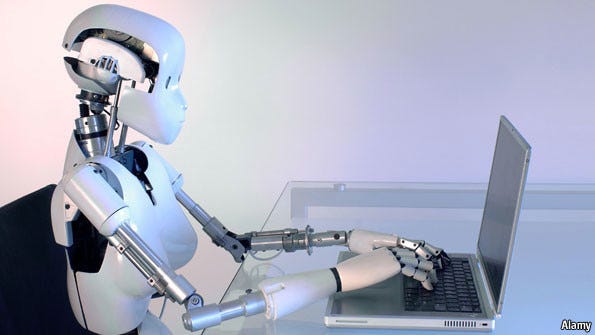Three Questions About The Robot Boom Currently Underway
The robots are coming! From manufacturing to journalism, technological automation seems to be infiltrating virtually every component of modern economic life. Robots have enhanced productivity at dairy farms (see HERE), replaced African children as jockeys for camel racing in the Middle East (click HERE), improved the speed and accuracy of fulfillment logistics at Amazon (click HERE), and even begun writing articles and books (click HERE). Robots are entertaining audiences with dance performances (click HERE) and rock concerts (click HERE). Narrative Science, a company that trains computers to write articles, estimates that more than 90% of news stories will be written by robo-journalists within the next 10-15 years (click HERE), while robo-advisors are already starting to manage large pools of money (click HERE).
Source: economist.com
Even the industrial robots that for decades have augmented factory workers at manufacturing sites are now taking on bigger roles. Prior to exiting the plasma TV business, Panasonic had a facility outside of Osaka that produced 2 million TV’s a month, with approximately 25 employees. Canon, the world’s largest maker of digital cameras and lenses, plans to remove all humans from manufacturing. And Foxconn, a Taiwanese manufacturing giant that manufactures many Apple products and has more than 1 million employees, plans to have 70% of its assembly-related work completed by robots in the next three years (click HERE).
So What? When thinking about the impact of robotics on our socio-economic lives, I focus on three key questions that I believe we should try to answer.
First, will robots create or destroy jobs? While conventional wisdom suggests that substitution of workers with robots destroys jobs, I don’t believe it is that simple. Schumpeterian creative destruction allows for innovation and investment in new industries and may in fact create jobs (click HERE). But in the short run, it may be lower aggregate wages/income, dampen prices for goods, and keep the lid on inflation.
Second, will robots make us richer or poorer? Because robots allow for a de facto transfer of economic gains from labor towards capital, there is a reasonable concern that the productivity gains will not flow to workers. Might this exacerbate the already problematic levels of inequality in the world today? What are the possible social reactions to such developments?
Third, how will robots affect the geography of manufacturing? I believe robots will have a huge impact. Why bother putting factories where labor rates are cheapest if labor is an increasingly miniscule component of costs? Might it make more sense to put facilities near demand? Given the large American consumer market, does manufacturing return to the United States? What does this mean for emerging economies that are hoping to use low-cost labor to incentivize manufacturers to hire locals?
In closing, it’s worth recalling the oft-recounted tale of Henry Ford II showing a newly automated factory to United Auto Workers union boss Walter Reuther. Ford asked how Reuther was planning on getting the robots to pay their dues. Without missing a beat, Reuther responded with “Henry, how are you going to get them to buy your cars?”
Vikram Mansharamani is a Lecturer at Yale University in the Program on Ethics, Politics, & Economics and a Senior Fellow at the Mossavar-Rahmani Center for Business and Government at the Harvard Kennedy School. Visit his website for more information or to subscribe to his mailing list. He can also be followed on Twitter.



